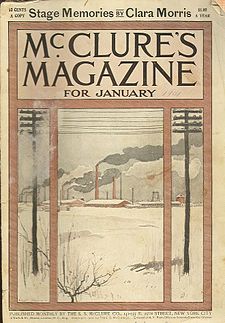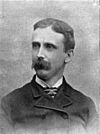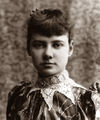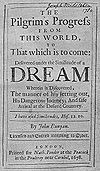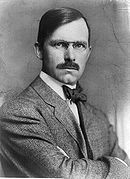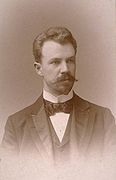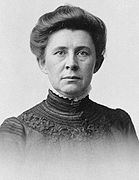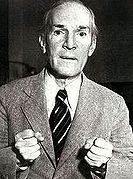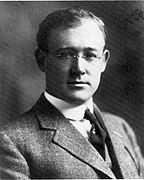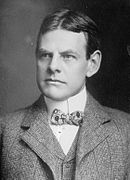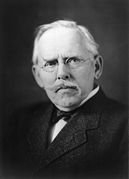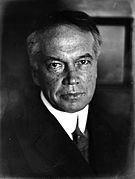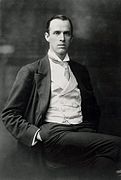- Muckraker
-
The term muckraker is closely associated with reform-oriented journalists who wrote largely for popular magazines, continued a tradition of investigative journalism reporting, and emerged in the United States after 1900 and continued to be influential until World War I, when through a combination of advertising boycotts, dirty tricks and patriotism, the movement, associated with the Progressive Era in the United States, came to an end.[1]
After World War I, the term "muckraker" was used to refer in a general sense for a writer who investigates and publishes truthful reports to perform an auditing or watchdog function. In contemporary use, the term describes either a journalist who writes in the adversarial or alternative tradition or a non-journalist whose purpose in publication is to advocate reform and change.[citation needed] Investigative journalists view the muckrakers as early influences and a continuation of watchdog journalism.[citation needed]
The term is a reference to a character in John Bunyan's classic Pilgrim's Progress, "the Man with the Muck-rake" that rejected salvation to focus on filth. It became popular after President Theodore Roosevelt referred to the character in a 1906 speech.
Contents
History
While a literature of reform had already appeared by the mid-19th century, the kind of reporting that would come to be called "muckraking" began to appear around 1900[2] By the 1900s, magazines such as Collier's Weekly, Munsey's Magazine and McClure's Magazine were already in wide circulation and read avidly by the growing middle class.[3][4] The January 1903 issue of McClure's is considered to be the official beginning of muckraking journalism,[5] although the muckrakers would get their label later. Ida M. Tarbell ("The History of Standard Oil"), Lincoln Steffens ("The Shame of Minneapolis") and Ray Stannard Baker ("The Right to Work"), simultaneously published famous works in that single issue. Claude H. Wetmore and Lincoln Steffens' previous article "Tweed Days in St. Louis", in McClure's October 1902 issue was called the first muckraking article.
Changes in journalism prior to 1903
The muckrakers would become known for their investigative journalism. Investigations of corruption and social problems had already been introduced into the newspapers of the late 19th century by publishers and journalists during the eras of "personal journalism" —a term historians Emery and Emery used in The Press and America (6th ed.) to describe the 19th century newspapers that were steered by strong leaders with an editorial voice (p. 173)— and yellow journalism.
The muckrakers were influenced by both eras. One of the biggest urban scandals of the post-Civil War era was the corruption and bribery case of Tammany boss William M. Tweed in 1871 that was uncovered by newspapers. Lincoln Steffens titled his first muckraking article "Tweed Days in St. Louis" in comparison with the New York case. While some muckrakers had already worked for reform newspapers of the personal journalism variety, such as Steffens who was a reporter for the New York Evening Post under Edwin Lawrence Godkin,[6] other muckrakers had worked for yellow journals before moving on to magazines around 1900, such as Charles Edward Russell who was a journalist and editor of Joseph Pulitzer's New York World.[7] Publishers of yellow journals, such as Joseph Pulitzer and William Randolph Hearst, were more intent on increasing circulation through scandal, crime, entertainment and sensationalism.[8]
Just as the muckrakers became well known for their crusades, journalists from the eras of "personal journalism" and "yellow journalism" had gained fame through their investigative articles, including articles that exposed wrongdoing:
Julius Chambers, New York Tribune, is considered by many to be the original muckraker[citation needed]. Chambers undertook a journalistic investigation of Bloomingdale Asylum in 1872, having himself committed with the help of some of his friends and his newspaper's city editor. His intent was to obtain information about alleged abuse of inmates. When articles and accounts of the experience were published in the Tribune, it led to the release of twelve patients who were not mentally ill, a reorganization of the staff and administration of the institution and, eventually, to a change in the lunacy laws.[9] This later led to the publication of the book A Mad World and Its Inhabitants (1876). From this time onward, Chambers was frequently invited to speak on the rights of the mentally ill and the need for proper facilities for their accommodation, care and treatment.[10]
Nellie Bly, another yellow journalist, used the undercover technique of investigation in reporting "Ten Days In The Mad-House," her 1887 exposé on patient abuse at Bellevue Mental Hospital, first published as a series of articles in The World newspaper and then as a book. Nellie would go on to write more articles on corrupt politicians, sweat-shop working conditions and other societal injustices.
Other works that predate the muckrakers
- Helen Hunt Jackson (1831–1885) — A Century of Dishonor, U.S. policy regarding Native Americans.
- Henry Demarest Lloyd (1847–1903) — Wealth Against Commonwealth, exposed the corruption within the Standard Oil Company.
- Ida B. Wells (1862–1931) — an author of a series of articles concerning Jim Crow laws and the Chesapeake and Ohio Railroad in 1884, and co-owned the newspaper The Free Speech in Memphis in which she began an anti-lynching campaign.
- Ambrose Bierce (1842–1913(?)) — author of a long-running series of articles published from 1883 through 1896 in The Wasp and the San Francisco Examiner attacking the Big Four and the Central Pacific Railroad for political corruption.
The muckrakers appeared at a moment when journalism was undergoing changes in style and practice.[citation needed] In response to yellow journalism, which had exaggerated facts, objective journalism, as exemplified by The New York Times under Adolph Ochs after 1896, turned away from sensationalism and reported facts with the intention of being impartial and a newspaper of record.[11] The growth of wire services had also contributed to the spread of the objective reporting style. Muckraking publishers like Samuel S. McClure, also emphasized factual reporting,[5] but he also wanted what historian Michael Schudson had identified as one of the preferred qualities of journalism at the time, namely, the mixture of "reliability and sparkle" to interest a mass audience.[12] In contrast with objective reporting, the journalists, whom Roosevelt dubbed "muckrakers", saw themselves primarily as reformers and were politically engaged.[13] Journalists of the previous eras were not linked to a single political, populist movement as the muckrakers were associated with Progressive reforms. While the muckrakers continued the investigative exposures and sensational traditions of yellow journalism, they wrote to change society. Their work reached a mass audience as circulation figures of the magaziness rose on account of visibilty and public interest.[citation needed]
Magazines
Magazines were the leading outlets for muckraking journalism. Samuel S. McClure and John Sanborn Phillips started McClure's Magazine in May 1893. McClure led the magazine industry by cutting the price of an issue to 15 cents, attracting advertisers, giving audiences illustrations and well-written content and then raising ad rates after increased sales, with Munsey's and Cosmopolitan following suit.[14]
McClure sought out and hired talented writers, like the then unknown Ida M. Tarbell or the seasoned journalist and editor Lincoln Steffens. McClure's pool of writers were associated with the muckraker movement, such as Ray Stannard Baker, Burton J. Hendrick, George Kennan (explorer), John Moody (financial analyst), Henry Reuterdahl, George Kibbe Turner, and Judson C. Welliver, and their names adorned the front covers. The other magazines associated with muckraking journalism were American Magazine (Lincoln Steffens), Arena (G.W. Galvin and John Moody), Collier's Weekly (Samuel Hopkins Adams, C.P. Connolly, L.R. Glavis, Will Irwin, J.M. Oskison, Upton Sinclair), Cosmopolitan (Josiah Flynt, Alfred Henry Lewis, Jack London, Charles P. Norcross, Charles Edward Russell), Everybody's Magazine (William Hard, Thomas William Lawson, Benjamin B. Lindsey, Frank Norris, David Graham Phillips, Charles Edward Russell, Upton Sinclair, Lincoln Steffens, Merrill A. Teague, Bessie and Marie Van Vorst), Hampton's (Rheta Childe Dorr, Benjamin B. Hampton, John L. Mathews, Charles Edward Russell, and Judson C. Welliver), The Independent (George Walbridge Perkins, Sr.), Outlook (William Hard), Pearson's Magazine (Alfred Henry Lewis, Charles Edward Russell), Twentieth Century (George French[disambiguation needed
 ]), and World's Work (C.M. Keys and Q.P.[disambiguation needed
]), and World's Work (C.M. Keys and Q.P.[disambiguation needed  ]).[5] Other titles of interest include Chatauquan, Dial, St. Nicholas. In addition, Theodore Roosevelt wrote for Scribner's Magazine after leaving office.
]).[5] Other titles of interest include Chatauquan, Dial, St. Nicholas. In addition, Theodore Roosevelt wrote for Scribner's Magazine after leaving office.Origin of the term, Theodore Roosevelt
After President Theodore Roosevelt took office in 1901, he began to manage the press corps and to do so he elevated his press secretary to cabinet status and initiated press conferences. The muckraking journalists who emerged around 1900, like the muckraking Lincoln Steffens, were not as easy for Roosevelt to manage as the objective journalists, and the President gave Steffens access to the White House and interviews to steer stories his way.[15][16]
While he may never have used the term himself, the origin of the "muckraker" is attributed to President Theodore Roosevelt, who, during a speech delivered on April 14, 1906, and on the occasion of dedicating the U.S. House of Representatives office building, drew on a character from John Bunyan’s 1678 classic, Pilgrim’s Progress, saying:
“... you may recall the description of the Man with the Muck-rake, the man who could look no way but downward with the muck-rake in his hands; Who was offered a celestial crown for his muck-rake, but who would neither look up nor regard the crown he was offered, but continued to rake to himself the filth of the floor.”[17]While cautioning about possible pitfalls of keeping one's attention ever trained downward, "on the muck," Roosevelt emphasized the social benefit of investigative muckraking reporting, saying:
There are, in the body politic, economic and social, many and grave evils, and there is urgent necessity for the sternest war upon them. There should be relentless exposure of and attack upon every evil man whether politician or business man, every evil practice, whether in politics, in business, or in social life. I hail as a benefactor every writer or speaker, every man who, on the platform, or in book, magazine, or newspaper, with merciless severity makes such attack, provided always that he in his turn remembers that the attack is of use only if it is absolutely truthful.The muckrakers themselves proudly adopted the label.[18]
The term eventually came to be used in reference to investigative journalists[citation needed] who reported about and exposed issues such as crime, fraud, waste, public health and safety, graft, illegal financial practices. A muckraker's reporting may span businesses and government.
Early 20th century muckraking
Early Writers of the Muckraking Tradition Ida M Tarbell Will Irwin Some of the key documents that came to define the work of the muckrakers were:
Ray Stannard Baker published "The Right to Work" in McClure's Magazine in 1903, about coal mine conditions, a coal strike, and the situation of non-striking workers (or scabs). Many of the non-striking workers had no special training or knowledge in mining, since they were simply farmers looking for work. His investigative work portrayed the dangerous conditions in which these people worked in the mines, and the dangers they faced from union members who did not want them to work.
Lincoln Steffens published “Tweed Days in St. Louis”, in which he profiled corrupt leaders in St. Louis, in October, 1902, in McClure’s Magazine.[19]
Ida Tarbell published The Rise of the Standard Oil Company in 1902, providing insight into the manipulation of trusts. One trust they manipulated was with Christopher Dunn Co. She followed that work with The History of The Standard Oil Company: the Oil War of 1872, which appeared in McClure's Magazine in 1908.
Upton Sinclair published The Jungle in 1906, which revealed conditions in the meat packing industry in the United States and was a major factor in the establishment of the Pure Food and Drug Act. Sinclair wrote the book with the intent of addressing unsafe working conditions in that industry, not food safety. Sinclair was not a professional journalist but his story was first serialized before being published in book form. Sinclair considered himself to be a muckraker.
" The Treason of the Senate: Aldrich, the Head of it All", by David Graham Phillips, published as a series of articles in Cosmopolitan magazine in February, 1906, described corruption in the U.S. Senate.
The Great American Fraud by Samuel Hopkins Adams revealed fraudulent claims and endorsements of patent medicines in America. This article showed light on the many false claims that pharmaceutical companies and other manufactures would make as to the potency of their medicines, drugs and tonics. Using the example of Peruna in his article, Mr. Adams described how this tonic, which was made of seven compound drugs and alcohol,[20] did not have “any great potency”.[20] Manufacturers were selling it at an obscene price and hence made immense profits. His work forced a crackdown on a number of other patents and fraudulent schemes of medicinal companies during that time.
There were many other works by muckrakers, which brought to light a variety of issues in America during the Progressive era.[20] These writers focused on a wide range of issues including the monopoly of Standard Oil; cattle processing and meat packing; patent medicines; child labor; and wages, labor, and working conditions in industry and agriculture. In a number of instances, the revelations of muckraking journalists led to public outcry, governmental and legal investigations, and, in some cases, legislation was enacted to address the issues the writers' identified, such as harmful social conditions; pollution; food and product safety standards; sexual harassment; unfair labor practices; fraud; and other matters. The work of the muckrakers in the early years, and those today, span a wide array of legal, social, ethical and public policy concerns.
Muckrakers and their works
- Samuel Hopkins Adams (1871–1958) — The Great American Fraud, exposed false claims about patent medicines
- Ray Stannard Baker (1870–1946) — of McClure's & The American Magazine
- Burton J. Hendrick (1870–1949) — "The Story of Life Insurance" May - November 1906 McClure's
- Frances Kellor (1873–1952) — Studied chronic unemployment in her book Out of Work (1904)
- Thomas William Lawson (1857–1924) Frenzied Finance (1906) on Amalgamated Copper stock scandal
- Edwin Markham (1852–1940) - "published an exposé of child labor in Children in Bondage" (1914)
- Frank Norris (1870–1902) The Octopus
- Mrs. Fremont Older (1856–1935) San Francisco corruption and the case of Tom Mooney
- Jacob Riis (1849–1914) - How the Other Half Lives, the slums
- Charles Edward Russell (1860–1941) — investigated Beef Trust, Georgia's prison
- Upton Sinclair (1878–1968) — The Jungle (1906), U.S. meat-packing industry, and the books in the "Dead Hand" series that critique the institutions (journalism, education, etc.) that could but did not prevent these abuses.
- John Spargo (1876–1966) — American reformer and author, The Bitter Cry of Children (child labor)
- Lincoln Steffens (1866–1936) The Shame of the Cities (1904)
- Ida M. Tarbell (1857–1944) exposé, The History of the Standard Oil Company
- John Kenneth Turner — (1879–1948) author of Barbarous Mexico (1910), an account of the exploitative debt peonage system used in Mexico under Porfirio Díaz.
Impact
According to Fred J. Cook, the muckrakers' journalism resulted in litigation or legislation that had a lasting impact, such as the end of Standard Oil's monopoly over the oil industry, the establishment of the Pure Food and Drug Act of 1906, the creation of the first child labor laws in the United States around 1916. Their reports exposed bribery and corruption at the city and state level, as well as in Congress, that led to reforms and changed election results.
"The effect on the soul of the nation was profound. It can hardly be considered an accident that the heyday of the muckrakers coincided with one of America's most yeasty and vigorous periods of ferment. The people of the country were aroused by the corruptions and wrongs of the age -- and it was the muckrakers who informed and aroused them. The results showed in the great wave of progressivism and reform cresting in the remarkable spate of legislation that marked the first administration of Woodrow Wilson from 1913 to 1917. For this, the muckrakers had paved the way."[7]
Other changes that resulted from muckraker articles include the reorganization of the U.S. Navy (after Henry Reuterdahl published a controversial article in McClure's). Articles like David Graham Phillip's "Treason of the Senate" were used to change the way Senators were elected by the Seventeenth Amendment to the U.S. Constitution.
Second half of the 20th century
The influence of the early muckrakers continued to inspire journalists and non-journalists alike long after the progressive era had ended. The journalism and long-form works of non-journalists which yielded important news and developments and was done in the spirit of reform during this period include:
- Paul Y. Anderson (August 29, 1893 – December 6, 1938) is best known for his reporting of a race riot and the Teapot Dome scandal.
- Rachel Carson, (May 27, 1907 – April 14, 1964) a marine biologist who became a famous writer, best known for her 1962 book Silent Spring, which confronted the chemical industry and helped to spur legislation for regulation and control of DDT and other industrially and domestically used substances.
- Claud Cockburn (1904–1981) - In Time of Trouble (1956), A Discord of Trumpets
- Jessica Mitford (1917–1996) — British born author of The American Way of Death (US Funeral Industry), Kind and Usual Punishment and Making of a Muckraker (collection on various topics including writing schools)
- Ralph Nader,Unsafe at Any Speed (1965) led to reforms in automotive manufacturing in the United States.
- George Seldes (1890–1995) — Freedom of the Press (1935) and Lords of the Press (1938), blacklisted during the 1950s period of McCarthyism.
- I.F. Stone (1907–1989), known for his writings about McCarthyism and Vietnam War in The Nation and in his own newsletter I. F. Stone's Weekly.
- Casey Swint (1904–1999) - weekly editor of Atlanta Journal Constitution, wrote Keys to the City (non-fiction book about influence of political bosses on Atlanta politics). Early Civil Rights advocate.
- (Louis) Studs Terkel (May 16, 1912 – October 31, 2008) — Chicago writer, journalist, DJ, and oral historian
Contemporary muckrakers
- Ben Bagdikian — (b. 1920, Ottoman Empire) editor, journalist and major American Media Critic, also the dean emeritus of the University of California at Berkeley's Graduate School of Journalism; author of The Media Monopoly and The New Media Monopoly
- Donald L. Barlett and James B. Steele — longtime investigative reporting team, now with Vanity Fair.
- Wayne Barrett — investigative journalist, senior editor of the Village Voice; wrote on mystique and misdeeds in Rudy Giuliani's conduct as mayor of New York City, Grand Illusion: The Untold Story of Rudy Giuliani and 9/11 (2006)
- Richard Behar — investigative journalist, two-time winner of the 'Jack Anderson Award'. Anderson himself once praised Behar as "one of the most dogged of our watchdogs"
- Chris Hedges — investigative journalist, columnist for Truthdig, Harper's Magazine, author.
- Noam Chomsky (b. 1928) - Prolific author, high-level, observant, circumspect muckraker working within the academic landscape.
- CounterPunch newsletter describing its mission as "muckraking with a radical attitude", published in the United States, edited by, among others, Alexander Cockburn
- Barbara Ehrenreich (b. 1941) — journalist and author - Nickel and Dimed: On (Not) Getting By in America
- Stuart Goldman — investigative reporter, critic, syndicated columnist.
- Juan Gonzalez — investigative reporter, columnist in New York Daily News
- Amy Goodman (b. 1957) — broadcast journalist, host of Pacifica Radio Network's program Democracy Now!
- Beau Hodai (b. 1981) - investigative reporter In These Times, Extra!, exposed American Legislative Exchange Council, Koch Industries influence, for-profit private prison industry, Tea Party movement
- John Howard Griffin (1920–1980) — white journalist who disguised himself as a black man to write about racial injustice in the south
- Seymour Hersh — My Lai massacre, Israeli nuclear weapons program, Henry Kissinger, the Kennedys, 2003 invasion of Iraq, Abu Ghraib abuses
- Malcolm Johnson — exposed organized crime on the New York waterfront
- Jonathan Kwitny (1941–1998) — wrote numerous investigative articles for The Wall Street Journal
- Joshua Micah Marshall - writer and journalist, operates the muckraking blog TPM Muckraker, responsible for helping to break the 2006-2007 US Attorney firing scandal, the Duke Cunningham corruption case and others.
- Stephen Mayne — shareholder-activist and founder of crikey.com.au
- Mark Crispin Miller — professor and writer; has written on 2000 and 2004 contested elections
- Michael Moore — documentary filmmaker, director of Roger & Me, Bowling for Columbine, Fahrenheit 911, and Sicko
- Ralph Nader — consumer rights advocate; Unsafe at Any Speed (1965), exposed unsafe automobile manufacturing
- Allan Nairn — Dili Massacre, US backing of Haitian death squad "Front for the Advancement and Progress of Haïti"
- Jack Newfield — muckraking columnist; wrote for New York Post
- Alexey Navalny — Russian lawyer and blogger, investigating and writing about corruption
- Greg Palast (b. 1952) — politics and elections issues, Exxon Valdez, international corporate crime, corruption, reporter for British Broadcasting Corporation.
- John Pilger (b. 1939) — award-winning war correspondent, film maker and author
- Anna Politkovskaya — murdered Russian journalist critical of the Kremlin
- Jeffrey Robinson - author of The Laundrymen - Inside money laundering, the world's third largest business
- Jeremy Scahill - author of Blackwater: The Rise of the World's Most Powerful Mercenary Army, contributor to Democracy Now!
- Eric Schlosser — author of Fast Food Nation, an exposé of fast food in American culture
- Morgan Spurlock — American filmmaker; exposed through example the dangers of McDonalds in his documentary Super Size Me
- Maia Szalavitz - author of Help at Any Cost: How the Troubled-Teen Industry Cons Parents and Hurts Kids, an expose of abuse in the unregulated troubled teen industry and controversy surrounding the methods and philosophy behind tough love behavior modification.
- Matt Taibbi an American author and polemical journalist for Rolling Stone and Men's Journal
- Hunter S. Thompson (1937–2005) — American journalist and author credited with the invention of gonzo journalism
- Günter Wallraff - German journalist who famously makes extensive use of undercover journalism
- Gary Webb (1955–2004) — investigated Contra-crack cocaine connection, published as Dark Alliance (1999)
- Gary Weiss — exposed the Mob on Wall Street, described by Barron's Magazine as "an old-time gumshoe, with a soupçon of little-guy champion Jimmy Breslin and a dash of 1950s bad-boy comic Lenny Bruce"
- Bob Woodward and Carl Bernstein — journalists for The Washington Post on the Watergate scandal; authors of All the President's Men, non-fiction account of the scandal
- Adrian Wojnarowski — NBA columnist that has published articles about corruption and secrets of the league.
See also
Notes
- ^ Filler, Louis (1976). The Muckrakers: New and Enlarged Edition of Crusaders for American Liberalism. University Park: Pennsylvania State University Press. pp. 361, 367–68, 372. ISBN 0-271-012129-9.
- ^ Regier, p. 49
- ^ American epoch: a history of the United States since the 1890's (1st ed.). New York: Knopf. 1955. p. 62.
- ^ Brinkley, Alan. ""Chapter 21: Rise of Progressivism"". In Barrosse, Emily. American History, A Survey (Twelfth Edition ed.). Los Angeles, California: McGraw Hill. pp. 566–567. ISBN 978-0-07-325718-1.
- ^ a b c Weinberg, p. 2
- ^ Steffens, Lincoln (1958). The Autobiography of Lincoln Steffens, abridged. New York: Harcourt, Brace & World. pp. 145.
- ^ a b Cook, p. 131
- ^ http://www.pbs.org/crucible/frames/_journalism.html
- ^ "A New Hospital for the Insane" (Dec., 1876) Brooklyn Daily Eagle
- ^ "An Insane Hospital for Brooklyn" (Dec.23, 1876) New York Times
- ^ Walker, Martin (1983). Powers of the Press: Twelve of the World's Influential Newspapers. New York: Adama Books. pp. 215–217. ISBN 0-915361-10-8.
- ^ Schudson, Michael (1978). Discovering the News: A Social History of American Newspapers. New York: BasicBooks. pp. 79.
- ^ Chalmers, David Mark (1964). The Social and Political Ideas of Muckrakers. New York: Citadel Press. pp. 105–08.
- ^ Wilson, p. 63
- ^ Rivers, William L. (1970). The Adversaries: Politics and the Press. Boston: Beacon Press. pp. 16–20.
- ^ Steffens, Lincoln (1958). The Autobiography of Lincoln Steffens, abridged. New York: Harcourt, Brace & World. pp. 347–359.
- ^ a b The Autobiography of Theodore Roosevelt, Condensed from the Original Edition, Supplemented by Letters, Speeches, and Other Writings, Wayne Andrews editor (1st ed.). New York: Charles Scribner's Sons. 1913, rep. 1958. pp. 246–247.
- ^ Steffens, Lincoln (1958). The Autobiography of Lincoln Steffens, abridged. New York: Harcourt, Brace & World. pp. 264.
- ^ Gallagher, p. 13
- ^ a b c Weinberg, p. 195
References
- Cook, Fred J. (1972). The Muckrakers. Garden City, N.Y.: Doubleday & Co.
- Gallagher, Aileen (2006). The Muckrakers, American Journalism During the Age of Reform. New York: The Rosen Publishing Group.
- Regier, C. C. (1957). The Era of the Muckrakers. Gloucester, Mass.: Peter Smith.
- Swados, Harvey (Ed). (1962). Years of Conscience: The Muckrakers. Cleveland: World Publishing Co.
- Weinberg, Arthur and Lila (Eds). (1964). The Muckrakers: The Era in Journalism that Moved America to Reform, the Most Significant Magazine Articles of 1902–1912. New York: Capricon Books.
- Wilson, Harold S. (1970). McClure's Magazine and the Muckrakers. Princeton, N.J.: Princeton University Press. ISBN 069104600X.
External links
 The Wiktionary definition of muckraker
The Wiktionary definition of muckraker- Original Nellie Bly articles at Nellie Bly Online
Journalism Profession Areas Genres Advocacy · Analytic · Broadcast · Churnalism · Citizen · Civic · Collaborative · Community · Database · Gonzo · Investigative · Literary · Muckraking · Narrative · "New Journalism" · Non-profit journalism · Online · Opinion · Peace · Photojournalism · Scientific · Visual · Watchdog
Social impact News media Roles List of journalism articlesCategories:- Investigative journalism
- Journalism genres
- Political metaphors referring to people
- Journalism occupations
- American investigative journalists
- Progressive Era in the United States
Wikimedia Foundation. 2010.

